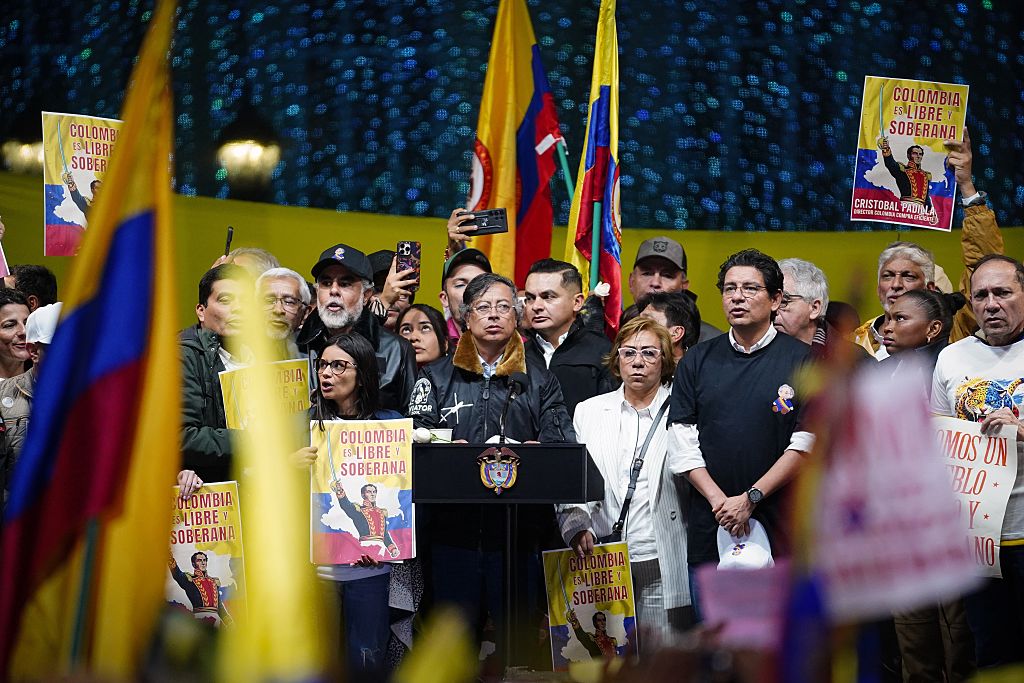President Álvaro Uribe on Colombia's Economic and Security Gains
President Álvaro Uribe on Colombia's Economic and Security Gains
Colombia's President Álvaro Uribe held a question-and-answer session, giving an overview of his country's economic progress and improved public safety. He also discussed constitutional changes underway that could allow the possibility of a third term.
President of Colombia Álvaro Uribe joined the Americas Society/Council of the Americas to discuss topics ranging from investment opportunities in Colombia to the Latin American trend of constitutional amendments allowing presidential reelection. The president stressed the importance of the U.S.-Colombia trade pact and private investment and was joined by Minister of Trade and Industry Luis Guillermo Plata. Noting the improved public safety situation in the country, he said, “We cannot accept brusque changes,” and gave an overview of the status of the current constitutional process that would allow him to seek a third consecutive term.
Uribe chose to change the typical format of a luncheon speech, inviting the audience to ask questions. During the discussion, he stressed Colombia’s interest in building relations with the private sector to lift people out of poverty and improve income distribution.
Minister Plata provided information about outsourcing, known also as business process outsourcing (BPO), noting that during research in India, the government discovered that there was a bottleneck in supply. As such, Colombia has rushed to fill in the gap. Now 42,000 people are employed in BPO in Colombia, with a goal of 120,000 people by 2012. BPO industries in Colombia—both now and as areas for growth—include voice-related outsourcing due to the neutral nature of Colombian Spanish, accounting, software/IT, customer service, and animation.
The president urged the minister to provide an overview of other growing sectors in Colombia. In the field of medical tourism, Colombia now has 11 clinics that have earned joint international certification. The country is also looking into growth in the field of biofuels, particularly ethanol, given that it is the second largest producer of sugarcane-based ethanol in Latin America after Brazil. Furthermore, with increased public security has come an upswing in tourism. While tourism rates dropped worldwide because of the economic crisis, they’ve grown by more than 9 percent in Colombia this year, going from basically almost no visitors five years ago to 2.4 million visitors today.
Addressing a question about growth for small- and medium-sized enterprises, the president and minister outlined an upswing in micro-lending. Uribe said that it has been easy for major corporations to access credit in Colombia, but noted, “We have advanced a lot at the base of the pyramid.” He said 4.5 million micro-entrepreneurs in Colombia have gained loans from BANCOLDEX, an import-export bank that was transformed into a bank for SMEs. Minister Plata noted that in 2002, 84 percent of BANCOLDEX loans went to large businesses while now only 8 percent do.
The president also described to the close relations between the United States and Colombia, saying he had felt optimistic about passage of a bilateral trade deal after meeting with U.S. President Barack Obama in June. “Now I am concerned because any delay in the approval of the bill to reform the health-care system could be a new delay for the approval of the free trade agreement with Colombia,” he said. But he praised a pending bilateral security agreement as “a new step in the right direction marked by Plan Colombia.”
In closing, the president talked about the future. He said Colombia needs to continue following three focus areas: safety, investment promotion, and social cohesion. “I consider that my country needs longer, longer time for these policies to produce the results,” he said. He added there is a constitutional process underway allowing for a referendum on whether presidents can run for a third term in Colombia. “My personal destiny—it depends on the constitutional court, it depends on the people and it depends on my God. But finally, as a member of a generation that has not lived one single day in peace, I have to fight until the end of my life.”








